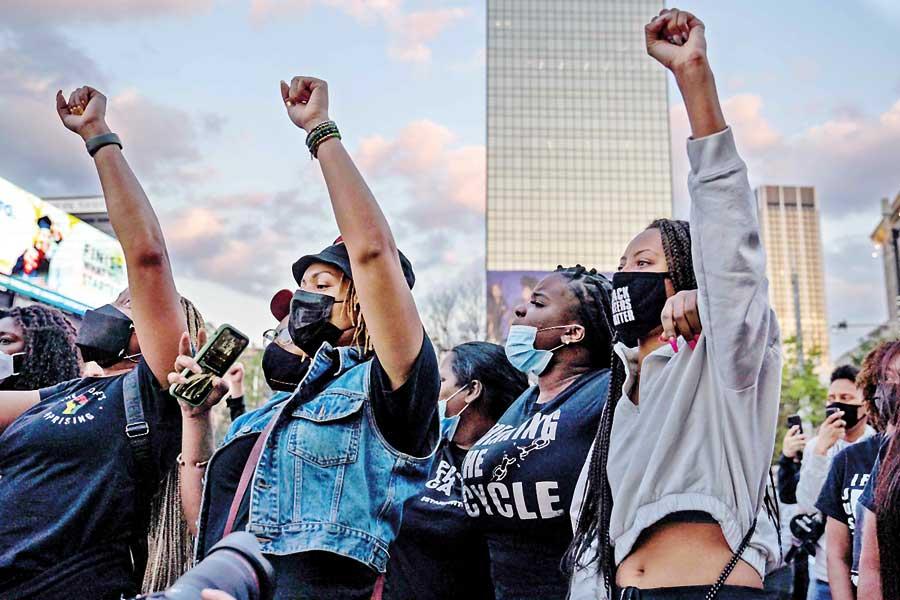Reply To:
Name - Reply Comment

In Atlanta, the United States, people march through the streets after the verdict was announced on April 20, finding Derek Chauvin guilty. AFP
With the George Floyd case highlighting the appalling status of policing in the United States and prompting the Attorney General to announce a probe to find whether police are using excessive force in Minneapolis where Floyd was murdered 11 months ago, my memory goes back to the early 1990s.
excessive force in Minneapolis where Floyd was murdered 11 months ago, my memory goes back to the early 1990s.
I had walked into a police station at Leicester City in the United Kingdom to interview the city’s first Asian police chief. While seated in the front office waiting for him, the happenings inside led me to visualize a comparison between the Leicester City police station and a Sri Lankan police station. My comparison was not on the state of the buildings or the interior settings. It was rather on the manner in which visitors were treated. I saw a youth. His teeth probably had not seen a tooth brush for months. He was shabbily clothed and appeared to be a substance addict. He was making inquiries from a police officer regarding some matter. The police officer was so polite that he addressed him ‘sir’ every time he replied. Sir is a word of respect in the UK. The police officer was upholding the dignity of the visitor.
Walk into a Sri Lankan police station. The first thing we experience is an adrenaline rush, even if the purpose of the visit is for a civil matter such as obtaining a no-crime certificate for a job interview. Especially, if the person appeared unkempt and is from a poverty-stricken area, the welcome would often be contemptuous and feudalistic. If in the US, the crisis over policing is largely racism, in Sri Lanka it is largely a class issue, with the police allegedly adopting a different yardstick when dealing with the rich and the powerful.
The dark and smelly lock-up rooms and the filth in vernacular give the police stations the ambience of a horror house. The unwelcome atmosphere is so mainstream that one wonders whether police officers are taught brutish behaviour and profanity during training.
It was only last month, Sri Lankans were aghast at the behaviour of a traffic cop at the Maharagama Junction. He was stomping on a driver flagged for alleged reckless driving and venting his anger in utter filth. Just as the Minneapolis police horror was filmed by a teenager when police officer Derek Chauvin kept pressing his knee on the neck of George Floyd for nine long minutes despite the victim’s “Mama, I can’t breathe’ plea, the Maharagama incident was also filmed by a civic-conscious passer-by. The clip went viral and triggered a social media campaign for police reforms with an emphasis on human rights and dignity.
In the past, there have been attempts by police ministers and police chiefs to improve the police-public relations and convert the police into a people-friendly force, but these efforts have fallen by the wayside because most officers appear to believe that torture or a good thrashing is the fastest and the most effective way to make a suspect cough up the truth. They care no two hoots about entrenched constitutional provisions guaranteeing freedom from torture and the United Nations Anti-Torture Convention, of which Sri Lanka is a signatory.
Despite a bevy of fundamental rights cases in the Supreme Court against police, it is no secret that torture and even custodial deaths still take place in Sri Lanka. On custodial deaths, the usual story is that while the suspect was being taken to a place to show police where he had kept his weapons or drugs, he had tried to grab a police officer’s weapons and in the melee, the police officers in self defence shot him. This story has been told so many times without compunction. It was repeated even after the Supreme Court in a landmark judgment last year -- in the Rathnayake Tharanga Lakmali v Niroshan Abeykoon case -- dismissed such police stories as “highly untenable” and said the police procedure, if the story was to be believed, was in contravention of Police Standing Order A20, which stipulates steps to be followed when a suspect is escorted.
Such custodial deaths are called encounters in India, where, according to the National Campaign Against Torture, five people die every day in police custody.
In the US, on average three people are killed in police shooting. According to the Police Integrity Research Group, more than 1,000 people – whites, blacks, Asians and Hispanics -- have been killed by police each year since 2013, while only a few officers have been prosecuted.
Underlining the urgency to find a solution to the policing issue, on April 20, the very day the 12-member jury found police officer Chauvin guilty for killing Floyd, a 16-year-old girl who was wielding a knife was shot dead in Columbus, Ohio by police officers answering an emergency call, though they could have used any of the non-lethal measures such as a Taser gun to subdue the suspect.
Although the Floyd case is being seen by many as depicting America’s systematic racism which President Joe Biden in comments expressed after the jury’s verdict described as a stain on the nation’s soul, it also emphasizes the urgent need for police reforms. In her comments on the guilty verdict, Vice President Kamala Harris insisted “we still must reform the system”, as she called on Congress to pass the Policing Bill named after George Floyd.
The issue is much more than ‘Black Lives Matter’. It is about reforms aimed at humanizing police not only in the US, but also in other countries, including Sri Lanka and the UK where the police came in for flak recently for their ugly behaviour in dispersing a crowd gathered for a vigil to protest the death of a woman who was alleged to have been kidnapped and killed by a Met police officer. The UK police, though one of the world’s best, have also been tainted by allegations of violence and fabrication of evidence. In the UK, there is a body to police the police. Set up in 2018, the UK’s Independent Office for Police Conduct (IOPC), which replaced the Independent Police Complaints Commission, is worth being adopted by other countries, including Sri Lanka where a National Police Commission exists sans much of its power after the adoption of the 20th Amendment to the Constitution.
We agree that police, as the primary state agency tasked with maintaining peace and ensuring public safety and law and order, have to be strong. Police officers are doing one of the world’s most dangerous jobs, putting their lives in risk so that we can live in peace. However, crime busting and crime prevention will be more effective if there is better rapport between the police and the people along with the adoption of modern techniques and witness protection mechanisms.
In most countries, people think the police are the most corrupt, probably after politicians. Through social media campaigns and public protests, people must push for police reforms and governments must implement such reforms which should be based on not only what the people think of police, but also what police think of the people.